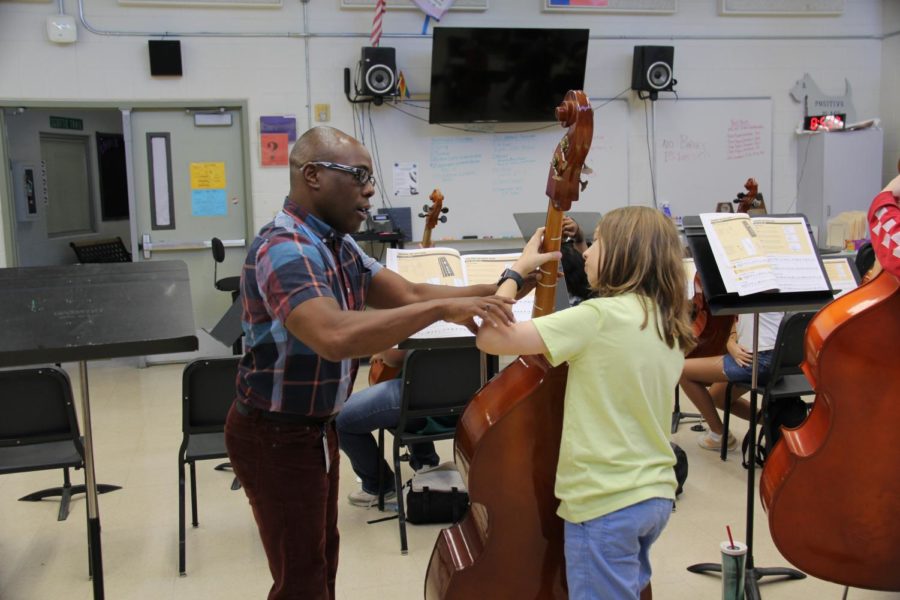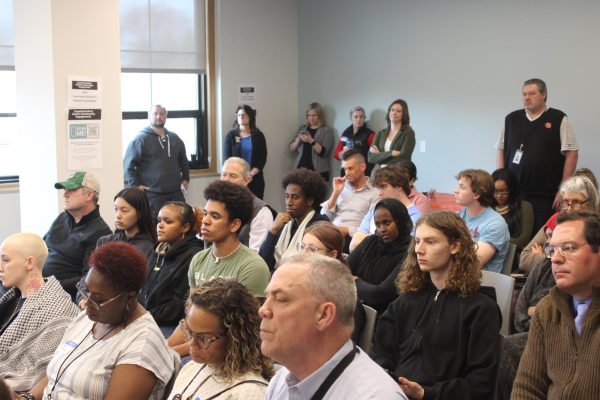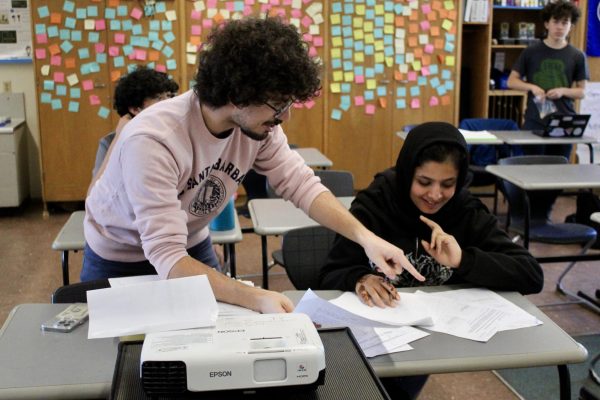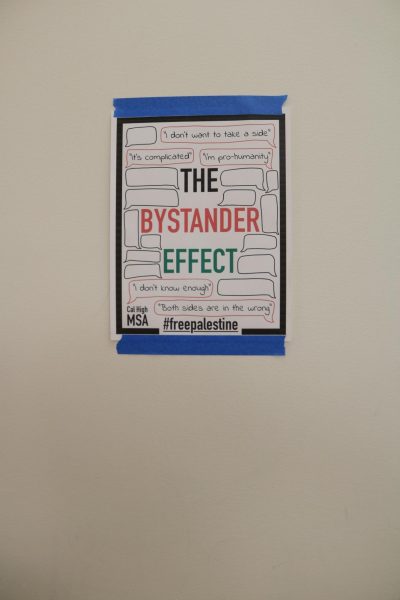Budget constraints force Mac orchestra directors to take over Lamar Middle School program
Necessary but imperfect solution leads to condensed classes, schedule changes, increased teacher workload
Orchestra director Ricky Pringle helps a sixth grader in the fifth-period beginner cello and bass class at Lamar Middle School learn notes and finger position.
September 13, 2022
As a result of AISD’s budget crisis, the award-winning McCallum Fine Arts Academy Orchestra faces a challenge it hasn’t encountered in over 20 years—sharing its directors with another school.
We want to do whatever we can to rebuild both programs so that we can bring back in a third person.
— assistant orchestra director Erika Elder
In the frenzy of an unavoidable 9% faculty cut at the end of last school year, fine arts programs at McCallum had to sacrifice or be sacrificed. As the cuts rolled out, the orchestra directors learned that the effects on their program would be significant. Assistant orchestra director Erika Elder was slated to move to Lamar Middle School, eliminating half of the program’s leadership. Orchestra director Ricky Pringle and Elder knew the resulting cuts to orchestra classes would be drastic and impossible, so they decided to split Lamar Middle School’s four orchestras between themselves and continue sharing responsibility for the McCallum orchestra program.
“It’s definitely scary,” Elder said. “It is going to be literally twice the amount of work because we’re trying to keep everything here at McCallum as similar as we can, while also picking up a second program, but we want to make it work. And we want to do whatever we can to rebuild both programs so that we can bring back in a third person.”
For Pringle and Elder, this shift will mean taking on double the students, double the work, double the concerts and adding travel time. For McCallum orchestra students, it means less time with the directors, schedule changes, cut and condensed specialized instrument classes and differences in the structure of orchestra classes.
“I don’t think it’s fair to the kids,” Pringle said. “I don’t think it’s fair to a lot of the parents who drive their kids all the way here for the specific things that we offer. Are we about to become the McCallum, Lamar orchestra program just as one? No, I don’t think so. I hope not. I will try to keep it as separate as possible. But we can only do so much.”
What we’re going to do is try to put forth the best program that we can because we know and believe in Mr. Pringle and Ms. Elder.
— Fine Arts Academy director Gabe Reyes
THE CAUSE
Fine Arts Academy director Gabe Reyes said that while he and Principal Nicole Griffith will always advocate for the Fine Arts Academy, they have a responsibility to adhere to the budget. When the orchestra’s current enrollment of 180 students was compared to the art program’s 1,200, a hard decision had to be made.
“Our main goal is that students have a wonderful orchestra experience where they come in, they feel like they’re challenged, they go and compete in UIL and they get the best Academy experience they can have,” Reyes said.
According to Reyes, taking reduced staffing and budget constraints and turning them into something where kids benefit requires “out-of-the-box” thinking. He claims that for Pringle and Elder to return to McCallum full-time, orchestra and Fine Arts Academy enrollment numbers need to rise considerably. But orchestra is one of the only fine arts programs at McCallum that doesn’t accept beginners, and the Fine Arts Academy enrollment numbers are already well under the projected 150-200 per grade.
“What’s really important for students to know is that we’re trying to do our best to make decisions that we feel will help our programs,” Reyes said. “But we’re certainly not going to say we have this 100% down. What we’re going to do is try to put forth the best program that we can because we know and believe in Mr. Pringle and Ms. Elder because they are awesome teachers. And we also want to listen to them, because they have a lot of feedback for us. And we’ve talked to them and we’re going to try this. If it works, awesome. If we need to expand, we can. If we need to reconfigure that’s what it’ll be.”
But for now, Pringle and Elder will be stretched thin.
“I can kind of feel a little bit of the burnout coming on,” Elder said. “It’s early in the year, so we’ll see. But it definitely does not feel like a sustainable job. But I’m happy enough to be there, like the kids are great, and everyone at Lamar is really nice. So it’s been a positive experience.”
I don’t think it’s fair to the kids. I don’t think it’s fair to a lot of the parents who drive their kids all the way here for the specific things that we offer.
— orchestra director Ricky Pringle
When Pringle began teaching at McCallum in 2001, there were only 40 students in the orchestra program. The classroom was so small that only 15 musicians could be in a class at a time. In addition to three strings classes, he was the piano and music theory teacher.
Pringle grew the program to be one of the most highly respected in Texas. His “first motivation” came when he was told that if he boosted enrollment in the orchestra program, he wouldn’t have to teach excess classes. By his fourth year at McCallum, the bass and freshman orchestra classes were added. In 2022, as Pringle enters his 21st year at McCallum, the orchestra program includes just under 180 students and boasts numerous awards including almost yearly sweepstakes at UIL competitions and high numbers of representatives in the TMEA Region and All-State Orchestras. Pringle’s new motivation is to restore the two full-time teaching positions to McCallum.
“Me coming in 2001, I was the first person to teach at McCallum and not have to teach McCallum and Lamar,” Pringle said. “The last director before me, she did that, and all the directors before her did that. So it’s kind of sad that after 21 years, it’s going back to this.”
THE EFFECT
According to Pringle, the creation of the sixth through 12th grade program will undoubtedly benefit orchestra students at Lamar. Frequent interaction between the young string players and McCallum’s upper and lower strings experts will ensure that the middle-schoolers are set up to succeed. Sacrifices will also be made, however. McCallum cello class and viola class have been combined, both violin and bass classes will be cut in half and Lamar isn’t offering any of the “extra” orchestra classes taught in previous years like fiddle class. Additionally, Pringle and Elder have had to adjust their teaching styles to fit the needs of students ages 11-18. Pringle, the self-described opposite of a “warm and fuzzy teacher,” said that by the time he gets to his McCallum classes at the end of the day, he has no more “nice” left.
“I have mixed feelings about it,” Pringle said. “I am excited that I will have a hand in what goes on at the middle school. I’m not completely excited about now adding three more groups to have to take to UIL from Lamar. I’m not excited about the prospect of having to do a winter concert with them and an end-of-the-year concert with them. I’m just trying to process what it’s gonna do long-term.”
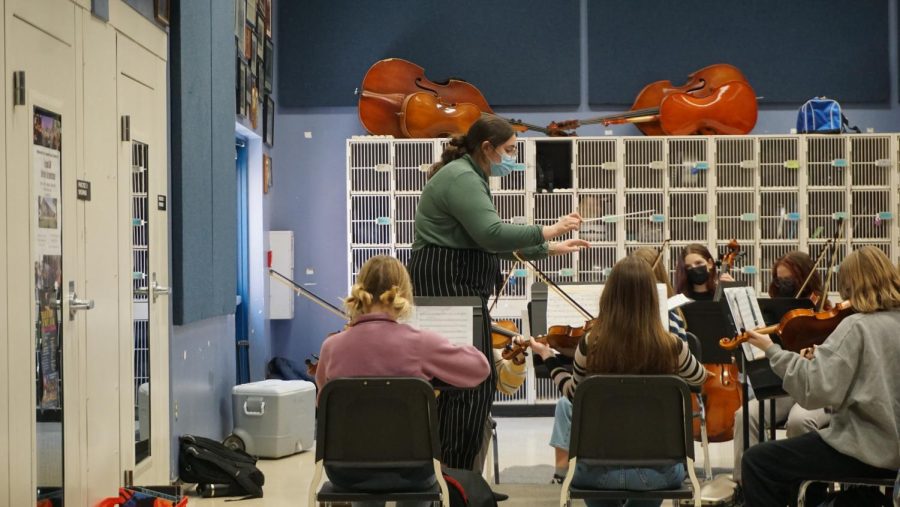
Pringle said that while he doesn’t feel that taking on Lamar is fair to him as a teacher, it’s hard to feel too bad when other AISD orchestra directors have it “much worse.” Some orchestra positions were cut to halftime, some were eliminated, and one middle school got rid of its fine arts program altogether. Elder said that a lot of middle schools are cutting their orchestra programs in half and high schools are eliminating assistant orchestra directors. She knows one middle school orchestra director who is teaching orchestra and guitar while traveling between multiple elementary orchestra programs in order to maintain a full-time position.
“I think it might ultimately kind of set a scary precedent that [a] teacher can do everything, middle school and high school,” Elder said. “I think that’s a trend that maybe our campus is excited about. But in reality, it puts a lot more work onto a teacher that’s already doing so much work. Just McCallum alone, we do weekends and after school a lot regularly. So now we’re just throwing in a whole extra program on top of that. That’s a lot of work for just two teachers in our case, but ultimately, it could be one teacher down the road if they see this and think it works.”
THE FUTURE
Senior bassist Peter Wiseman said he’s upset that the program he has considered his home base at school over the past few years will change.
I do think we’re worse off. But what had to happen was a lot better than the alternatives.
— senior Peter Wiseman
“I do think we’re worse off,” Wiseman said. “But what had to happen was a lot better than the alternatives. I think things will be okay but not as fun or as they could have been. I am a little worried, frustrated.”
As a person who is seriously considering pursuing music professionally, Wiseman is sad that the district’s solution to budget issues is so often cutting fine arts programs.
“I think in general, a lot of people, especially people with money, undervalue music,” Wiseman said. “I guess that’s something I’m going to have to get used to.”
According to Pringle, the district doesn’t understand that orchestra is a “path forward” for many students.
“Orchestra does a lot of different things for different people,” Pringle said. “For some people, it’s a place where they find their friends. It’s a place where the real serious kids get to work on their skills, work on leadership skills and do all of those things. For some, depending on what your background is, like, for me, it was a nice way to better my life.”
Three weeks into the school year, Elder said she and Pringle are already struggling to stay on top of everything that leading two orchestra programs demands.
“The hardest part is just the work hours in general,” Elder said. “On A days, I have to be there by 7:30 a.m. And I usually stay at McCallum until 6 p.m. And also, just like staying on top of a massive to-do list. But there are so many needs to be met in both programs. And there are only two of us. We’re splitting the difference, but we’re really struggling to stay on top of everything.”
I do not think this is a sustainable fix. If they do decide to keep it, it’s just going to be a revolving door of teachers going in and out because I don’t think anyone will want to stay in this situation.
— assistant orchestra director Erika Elder
Pringle said that unless he can return to McCallum full-time, the future of the orchestra program and his place in it is insecure.
“If something doesn’t change in terms of more investment into our programs, I see programs disappearing permanently,” Pringle said. “If things come back, if things come right, then I could definitely see myself being here in 10 years and maybe a little bit beyond that. And if not, I don’t know.”
While this year’s budget constraints are binding, Pringle and Elder agree that this will not work as a permanent solution.
“I do not think this is a sustainable fix,” Elder said. “I really do not. If they do decide to keep it, it’s just going to be a revolving door of teachers going in and out because I don’t think anyone will want to stay in this situation.”
This story was originally published on The Shield Online on September 7, 2022.

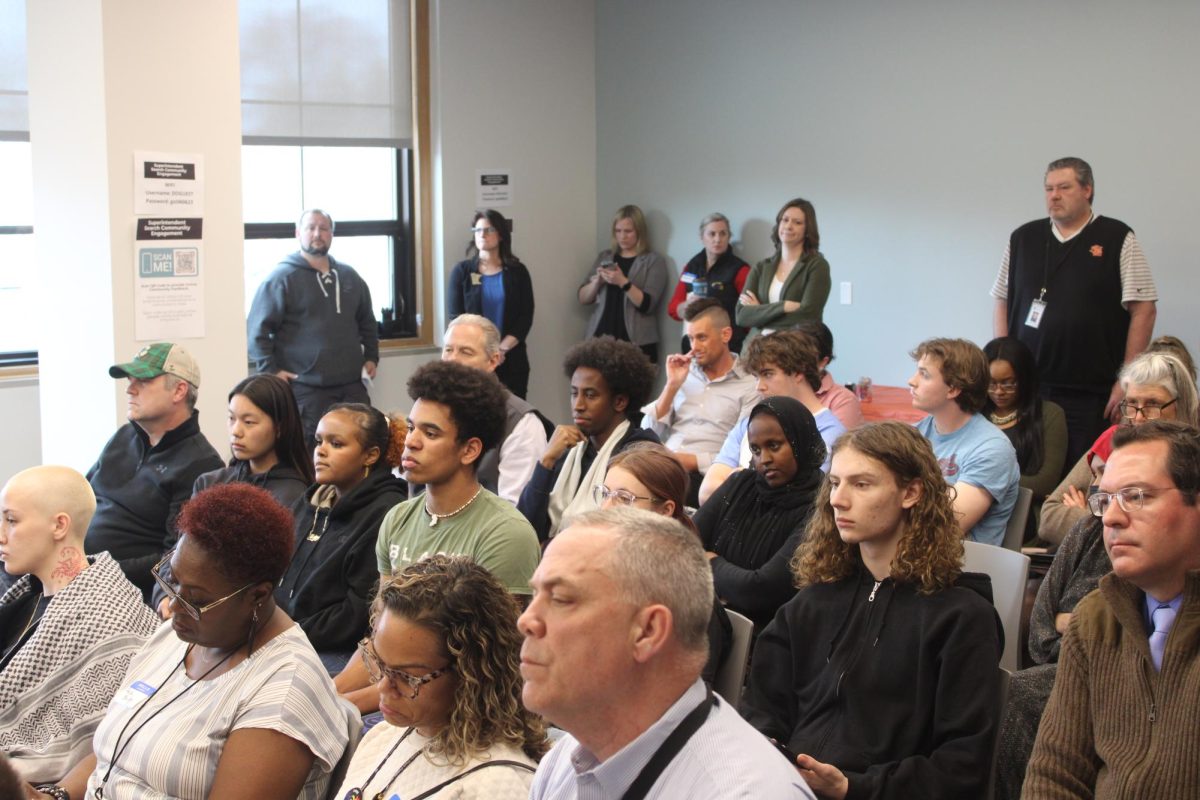









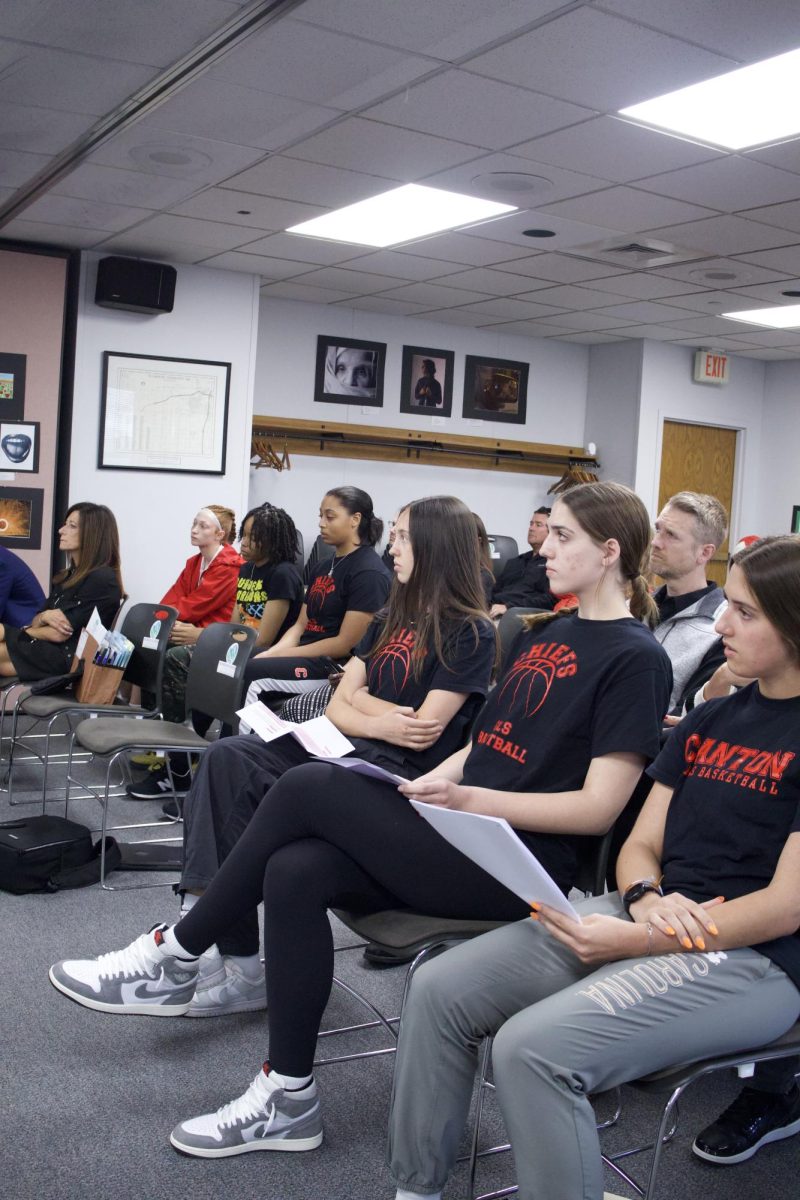



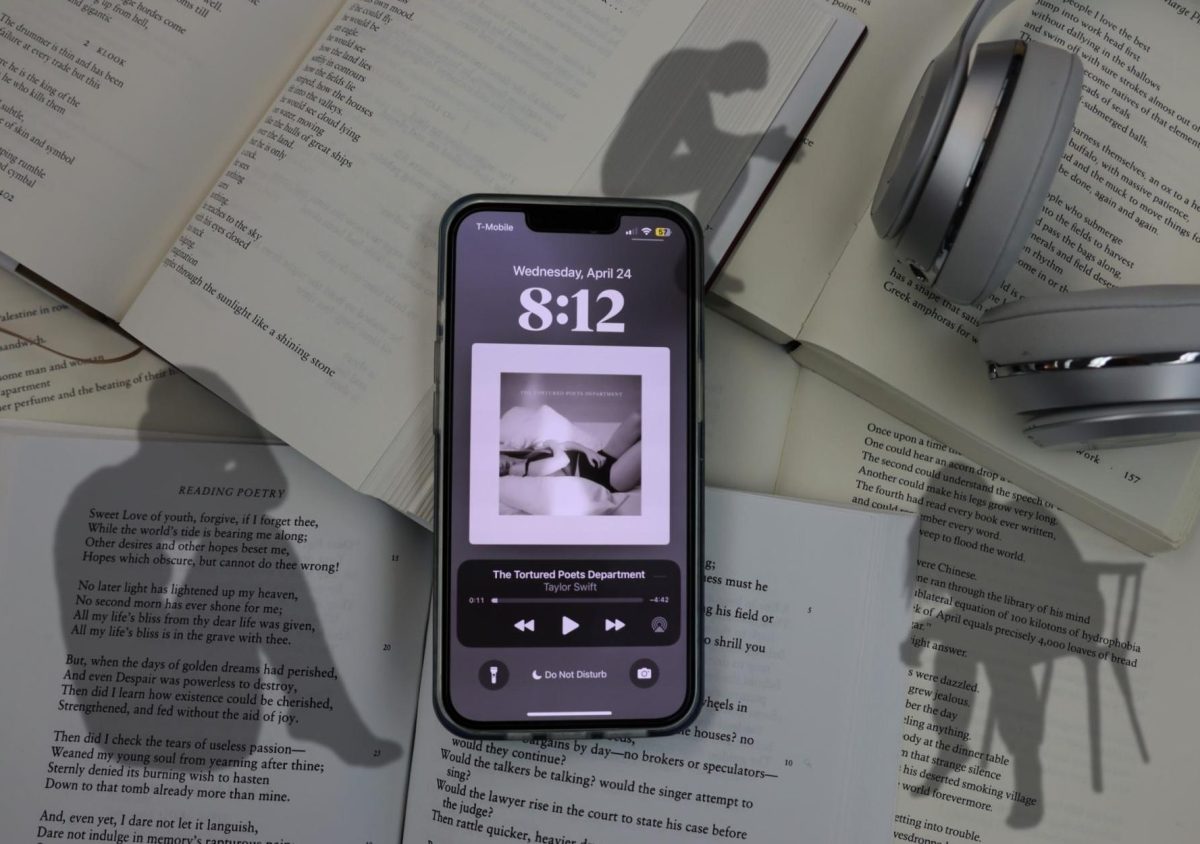














![IN THE SPOTLIGHT: Junior Zalie Mann performs “I Love to Cry at Weddings,” an ensemble piece from the fall musical Sweet Charity, to prospective students during the Fine Arts Showcase on Wednesday, Nov. 8. The showcase is a compilation of performances and demonstrations from each fine arts strand offered at McCallum. This show is put on so that prospective students can see if they are interested in joining an academy or major.
Sweet Charity originally ran the weekends of Sept. 28 and Oct. 8, but made a comeback for the Fine Arts Showcase.
“[Being at the front in the spotlight] is my favorite part of the whole dance, so I was super happy to be on stage performing and smiling at the audience,” Mann said.
Mann performed in both the musical theatre performance and dance excerpt “Ethereal,” a contemporary piece choreographed by the new dance director Terrance Carson, in the showcase. With also being a dance ambassador, Mann got to talk about what MAC dance is, her experience and answer any questions the aspiring arts majors and their parents may have.
Caption by Maya Tackett.](https://bestofsno.com/wp-content/uploads/2024/02/53321803427_47cd17fe70_o-1-1200x800.jpg)
![SPREADING THE JOY: Sophomore Chim Becker poses with sophomores Cozbi Sims and Lou Davidson while manning a table at the Hispanic Heritage treat day during lunch of Sept 28. Becker is a part of the students of color alliance, who put together the activity to raise money for their club.
“It [the stand] was really fun because McCallum has a lot of latino kids,” Becker said. “And I think it was nice that I could share the stuff that I usually just have at home with people who have never tried it before.”
Becker recognizes the importance of celebrating Hispanic heritage at Mac.
“I think its important to celebrate,” Becker said. “Because our culture is awesome and super cool, and everybody should be able to learn about other cultures of the world.”
Caption by JoJo Barnard.](https://bestofsno.com/wp-content/uploads/2024/01/53221601352_4127a81c41_o-1200x675.jpg)




